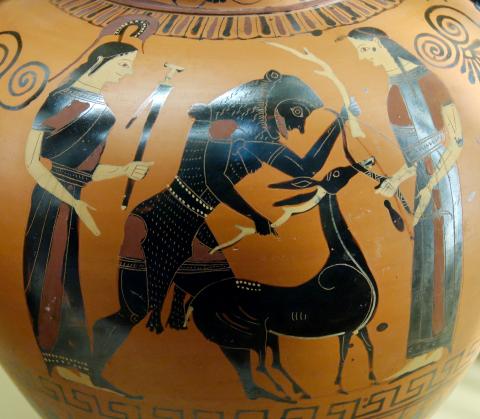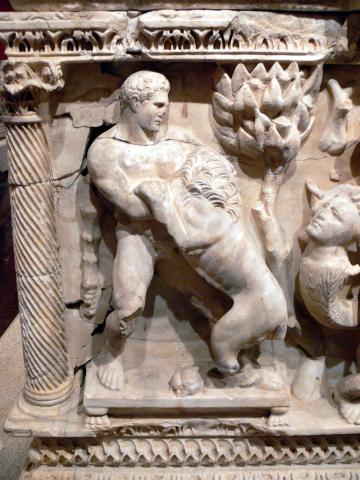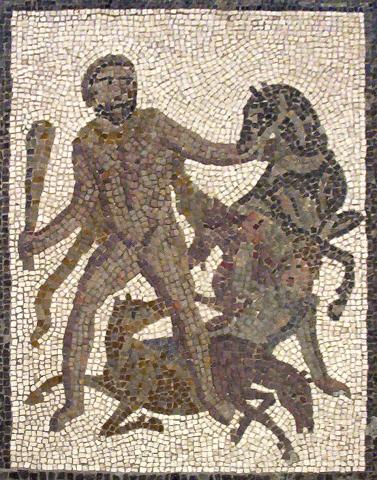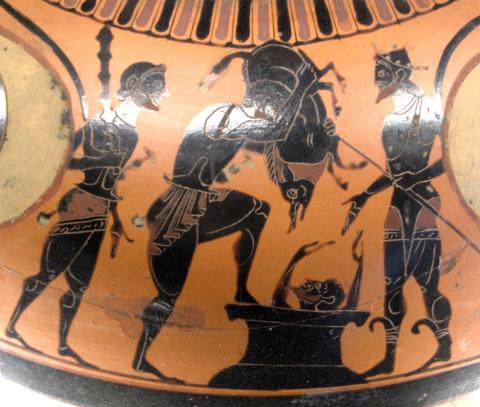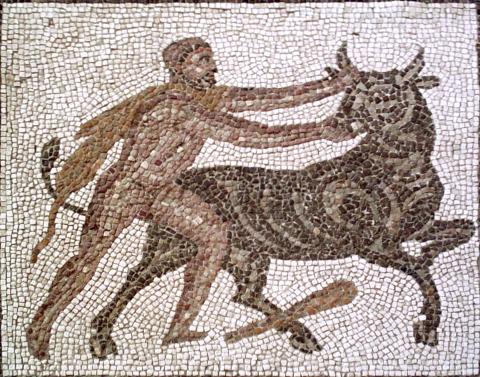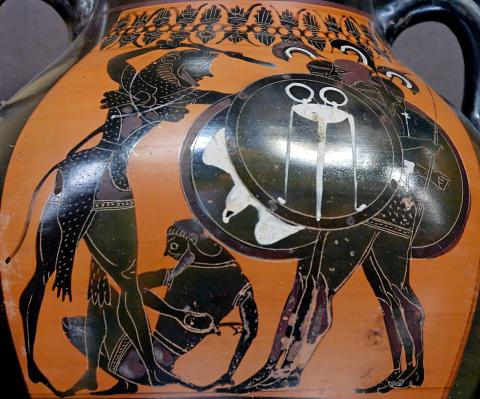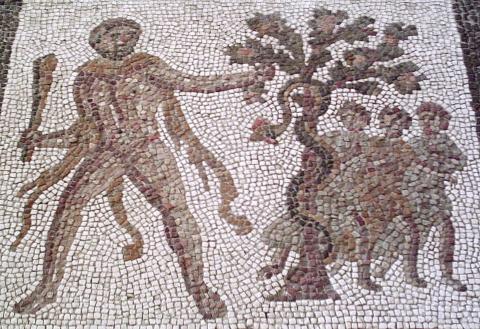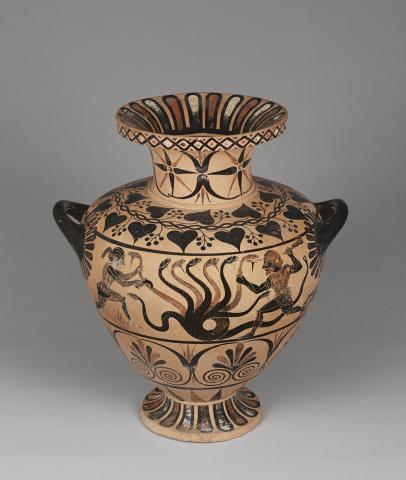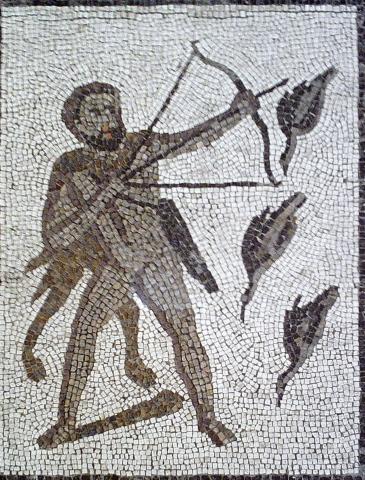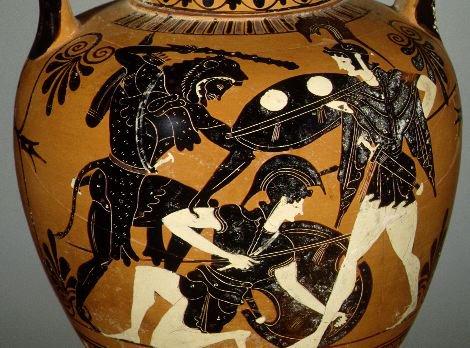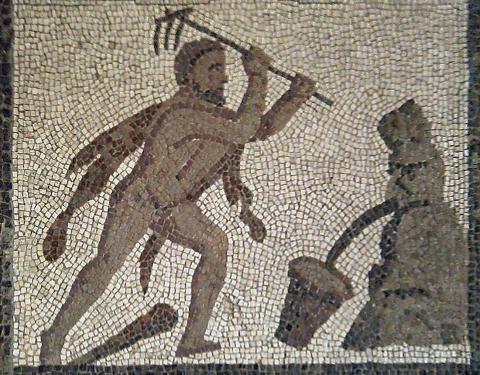Amphytriōn. Megara.
AM. Ō magne Olympī rēctor et mundī arbiter,205
iam statue tandem gravibus aerumnīs modum
fīnemque clādī. nūlla lūx umquam mihi
sēcūra fulsit; fīnis alterius malī
gradus est futūrī. prōtinus reducī novus
parātur hostis; antequam laetam domum210
contingat, aliud iussus ad bellum meat;
nec ūlla requiēs, tempus aut ūllum vacat,
nisi dum iubētur. sequitur ā prīmō statim
īnfēsta Iūnō; numquid immūnis fuit
īnfantis aetās? mōnstra superāvit prius215
quam nōsse posset. gemina cristātī caput
anguēs ferēbant ōra, quōs contrā obvius
reptāvit īnfāns, igneōs serpentium
oculōs remissō lūmine ac placidō intuēns;
artōs serēnīs vultibus nōdōs tulit,220
et tumida tenerā guttura ēlīdēns manū
prōlūsit hȳdrae. Maenalī pernīx fera,
multō decōrum praeferēns aurō caput,
dēprēnsa cursū; maximus Nemeae timor,
pressus lacertīs gemuit Herculeīs leō.225
quid stabula memorem dīra Bistoniī gregis
suīsque rēgem pābulum armentīs datum,
solitumque dēnsīs hispidum Erymanthī iugīs
Arcadia quatere nemora Maenalium suem,
taurumque centum nōn levem populīs metum?230
inter remōtōs gentis Hesperiae gregēs
pāstor trifōrmis lītoris Tartēsiī
perēmptus, ācta et praeda ab occāsū ultimō;
nōtum Cithaerōn pāvit Ōceanō pecus.
penetrāre iussus sōlis aestīvī plagās235
et adusta medius rēgna quae torret diēs
utrimque montēs solvit ac ruptō ōbice
lātam ruentī fēcit Ōceanō viam.
post haec adortus nemoris opulentī domōs
aurifera vigilis spolia serpentis tulit.240
quid? saeva Lernae mōnstra, numerōsum malum,
nōn igne dēmum vīcit et docuit morī,
solitāsque pinnīs condere obductīs diem
petīt ab ipsīs nūbibus Stymphālidas?
nōn vīcit illum caelibis semper torī245
rēgīna gentis vidua Thermōdontiae,
nec ad omne clārum facinus audācēs manūs
stabulī fugāvit turpis Augēī labor.
Notes
Amphitryon begs Jupiter to release Hercules from his Labors, and in the process gives a catalogue of the canonical twelve labors.
Act 2 Essay
The day dawns on a kingdom struggling with the consequences of Hercules’ absence in the Underworld. Lycus has usurped the throne of Thebes and killed Megara’s brothers. Hercules’ aged father Amphitryon and wife Megara now wonder if Hercules is alive or has perished in the land of the dead. Amphitryon catalogs Hercules’ Labors, which helps to preview his later argument with Lycus over their significance.
read full essay
Lycus enters, defends his actions, and taunts Amphitryon by questioning Hercules’ divine ancestry and telling unflattering stories about him. Lycus then proposes that Megara marry him in order to legitimize his claim to the throne. When she angrily refuses, Lycus threatens to burn down the temple where the family has taken refuge. These plans are interrupted by a rumbling from below, signaling Hercules’ imminent return.
Hercules was the most popular Greco-Roman hero, and so hundreds of stories grew up around him. The argument between Amphitryon and Lycus draws on a lengthy ancient tradition of examining the meaning of these stories. Like Lycus, Greek comedy such as Aristophanes’ Frogs emphasized Hercules’ gluttony and sexual excess. Like Amphitryon, philosophers made Hercules an allegorical figure of virtue. An influential story by Prodicus of Ceos (5th c. BCE) told how Hercules chose a life of hardship and labor rather than ease and comfort, and so was rewarded with divinity (Xenophon Memorabilia of Socrates 2.1). When Amphitryon defends Hercules’ divine parentage, he willingly accepts his role as the foster father of an illegitimate son. Seneca discussed the significance of Hercules stories elsewhere in his philosophical essays, such as On the Constancy of the Wise Person (2.1-2) or On Providence (2.7-9). His typical argument is that these entertaining stories of heroes and villains distract us from the more important truths taught by the Stoics. Hercules benefitted humanity by eliminating a few monsters, but a good ruler can achieve far more good without leaving his palace; and ordinary people can demonstrate more meaningful heroism by enduring life’s challenges. Lycus is a villain in the Hercules Furens and soon to die, but these other contexts suggest that his argument is not entirely wrong.
Lycus then turns on Megara and attempts to persuade her to enter a marriage of convenience. She will be once more married to a king of Thebes rather than being a helpless widow, while the Theban people might accept him more readily if he were married to the former queen. Megara’s insistence on death before marriage to her family’s killer exemplifies the Stoic teaching that it is better to take your own life than submit to oppression that would compromise your virtue. Her ringing call to Lycus to kill her, and his angry agreement, ends the scene on a cliffhanger.
Shakespeare adapted the conflict between Lycus and Megara for an early scene between Gloucester and Lady Anne in his historical tragedy Richard III (Act 1, Scene 2). Gloucester, the future usurping king Richard, has killed Lady Anne’s husband and now proposes to marry her. In a bravado riff on Seneca, he hands Anne his sword and invites her to stab him. By the end of the scene, she has agreed to marry him; she is a pragmatic Elizabethan noblewoman, rather than a Stoic heroine like Megara.
205 rēctor … arbiter: the first of these words is commonly applied to Jupiter in poetry (LS rector II); the second more often denotes a human judge, someone who solves disputes (OLD arbiter 2). Amphitryon appeals to Jupiter as a powerless plaintiff to a higher authority. But this formal address of Jupiter as ruler of Olympus and the universe is ironic, considering the control that Jupiter’s wife, Juno, exerts on the action of the play from the beginning.
206 iam … tandem: “now at last,” emphasizing how long Hercules’ Labors have been going on.
206–7 aerumnīs … clādī: indirect objects of statue … modum / fīnemque.
207 nūlla lūx: “no daylight,” i.e., no day. mihi: dative of advantage (AG 376)
208 sēcūra: with an adverbial sense. Amphytrion is anxious every day. fulsit: “has gleamed” (> fulgeō), i.e., since Hercules has been occupied by his labors and unable to defend Amphitryon.
208–9 prose order would be fīnis alterius malī est gradus ad futūrum (malum). Seneca’s order creates a balance between the two genitives, alterius malī and futūrī (malī). alterius: from alius –a –um, not alter –a –um. gradus: “(first) step,” “beginning.”
209 reducī: “for [Hercules] as he returns.” The omission of a noun or pronoun to go with reduci is difficult, but Fitch (1987) cites parallels at lines 33, 275, and 831.
210 parātur: “is supplied,” i.e., by Juno and her agent on earth, Eurystheus. The position of novus at the end of the previous line is emphatic. We have now transitioned rather abruptly from Amphitryon’s woes to those of Hercules.
210 antequam: governs the subjunctive contingat (AG 550).
211 aliud ... ad bellum: the word order puts emphasis on aliud. Describing the Labors as warfare enables a metaphorical comparison between Hercules and a frequently called-up soldier, and Amphytryon as the aging, abandoned father. iussus … meat: “is ordered to go,” literally “goes, having been ordered.” The emphasis is on Hercules’ unjust subjection to the orders of Eurystheus.
212 requiēs: understand est. tempus: the subject of vacat, “is unoccupied.” Note the chiastic word order: ūlla-requiēs-tempus-ūllum, emphasizing that Hercules does not get any respite.
213 nisi dum: “unless while.” Hercules’ only rest is when he is listening to instructions for his new task.
213–22 Amphitryon recalls how Juno has persecuted Hercules since his birth. When he was an infant in his cradle, she sent snakes to destroy him, <AP LINK>but he was able to strangle them. Amphitryon characterizes this early feat as practice for Hercules’ later encounter with the Lernaean Hydra (222 prōlūsit hȳdrae). An Attic red-figured stamnos from Vulci, Etruria (ca. 480–470 BC), now in the Louvre Museum, shows Hercules strangling the snakes.
213–15 sequitur … aetās: repetition of s, f, u, and the nasals m and n express Amphitryon’s indignation. The similarity of īnfēsta and īnfantis at the start of successive lines is particularly striking: Juno was hostile even when Hercules was a baby.
213 sequitur: “has been pursuing.” The present tense can be used with temporal constructions like ā prīmō statim (“right from the beginning” of Hercules’ life) to indicate a past action that continues into the present (AG 466).
214 numquid: introduces an urgent question, expecting the answer “no.”
215 īnfantis aetās: “his infant’s period of life,” i.e., “his infancy.” īnfantia –ae, was avoided in poetry.
215–16 prius / quam: “before,” introducing a clause of time with the subjunctive posset (AG 550). nōsse = nōvisse > nōscō. Hercules was so young that he did not even understand what the mōnstra were.
216–17 Prose order: anguēs, cristātī caput, ōra gemina (ad Herculem) ferēbant. cristātī caput: “crested with respect to their heads,” i.e., “with crests on their heads.” Caput is the so-called “Greek” accusative, found in poetry and later Latin (and commonly in Greek), to denote the body part affected (AG 397.b). The plural ōra (> os oris n.) means “features, face, visage,” not just “mouths.” This is the first of many examples of elaborate word order in Amphitryon’s description of Hercules’ Labors. The technique gives the passage a lofty tone. There may also be an allusion to the Aeneid: Seneca’s description of the anguēs begins with the word gemina, just like Virgil’s description of the giant anguēs who killed Laocoon and his sons (Aen. 2.203–4 ecce autem geminī … anguēs).
217–18 quōs contrā obvius / reptāvit īnfāns: quōs is a connecting relative (= eōs), accusative after contrā, “towards” (with hostile intent: LS contra II.A.2.b). Obvius, “so as to confront (an advancing enemy),” has adverbial force (AG 290) and emphasizes the meaning of quōs contrā: “the infant crawled towards (the snakes) to confront them.” The diction injects some humor into Amphitryon’s lament. Contrā obvius suggests a confrontation between warriors on the battlefield and is deflated by the anticlimactic image of an infant crawling in his crib. reptāvit: associates both the snakes and the infant: they both “crawl.” %% Part of the manuscript tradition has the imperfect reptābat, but the perfect tense here matches the perfects used to describe Hercules’ actions in the rest of the sentence (tulit, prōlūsit). It is likely that reptāvit was corrupted to reptābat to match the imperfect ferēbant in the previous line.
218–19 The snakes’ “fiery eyes” (igneōs … oculōs) contrast with Hercules’ “relaxed and calm gaze” (remissō lūmine ac placidō). lūmine = “gaze” is poetic and varies oculōs in the same line. intuēns: modifies īnfāns.
220 vultibus: poetic plural > vultus -ūs m., referring to Hercules’ facial expression (LS vultus). tulit: “he endured” the snakes’ coils as they tried to squeeze the life out of him. Endurance is one of Hercules’ key virtues, one which he demonstrates from earliest infancy.
221 et tumida tenerā guttura ēlīdēns manū: the interlaced word order (tumida… guttura, tenerā … manū) helps to create the visual image of Hercules’ battle with the entwining snakes; the action of the scene is emphasized by alliteration of t and the rapid sequence of short syllables in tŭmĭdă tĕnĕrā. Note also how the elision in guttur(a) ēlīdēns suggests Hercules “crushes” the serpents’ necks. As with the contrast between Hercules’ eyes and the snakes’, here the contrast is between the infant’s “tender hands” and the snakes’ “swollen throats.”
222 prōlūsit hȳdrae “practiced for the Hydra.” prōlūdere means to exercise or practice ahead of time for some kind of contest.
222–48 Amphitryon begins to catalogue Hercules’ canonical Twelve Labors, though not quite in the traditional order, and omitting the retrieval of Cerberus from the Underworld, which will be dealt with extensively later. After concluding the previous sentence with the slaying of the Hydra, he starts with the capture of the Maenalian Deer, and the killing of the Nemean Lion. Then come the Mares of Diomedes, the Erymanthean Boar, the Cretan Bull, the Cattle of Geryon, the Apples of the Hesperides, the Hydra of Lerna, the Symphalian Birds, Hippolyta’s Girdle, and the Stables of Augeas. The stories are referred to rather than told, and prior knowledge of the details is assumed. Compare the fuller versions found in Apollodorus, Library 2.5 <APLINK>. Amphitryon’s purpose throughout is to protest about the lack of rest (requiēs 212) given to Hercules, and, looking forward, to paint a pointed contrast between Hercules, the benefactor of mankind, and the wicked tyrant Lycus (see 250–254). A 3rd century AD Roman mosaic from Llíria, Spain, now in the National Archaeological Museum, Madrid, displays many of the Labors (hereafter referred to as the “Llíria mosaic”).
222 Maenalī pernīx fera: some writers placed the animal in Ceryneia (hence the commonly used shorthand “Ceryneian Hind,” a hind being an old name for deer), but Seneca instead places it on Mount Mainalion. The broader region is consistent in all versions: Arcadia. An Attic black-figured neck-amphora (ca. 540–530 BC, possibly from Vulci, Etruria) shows Hercules capturing the deer as the goddesses Athena (on the left) and Artemis (on the right) look on.
223 A description of the deer’s golden horns.
224 dēprēnsa: pf. ptc. > dēprehendo or dēprendo, “catch”; supply est. The subject is 222 fera. cursū: “in its flight” or “while running.”
224–25 maximus Nemeae timor ... leō: Hercules killed an enormous lion in the region of Nemea. The lion’s pelt is one of the most common identifying attributes of Hercules in ancient art, where he either carries it or wears it as a kind of helmet. A sarcophagus from the 2nd century AD, now in the Antalya Museum, Turkey, shows the story.
225 lacertīs … Herculeīs: poets often use an adjectival form of a name in place of a genitive, either for variation or for metrical necessity. As at 221, Seneca has carefully arranged the words: the nominative participle (pressus) and antecedent (leō) bracket the ends of the line, ablative noun (lacertīs) and adjective (Herculeīs) stand inside these words, and the verb (gemuit) in the center. Note also the similarity in sound between dēprēnsa and pressus at the start of successive lines, helping to link one Labor to the next.
226–30 Seneca uses the rhetorical device of praeteritio (also called paralipsis in Greek) to briefly mention without describing three more of Hercules’ Labors: the capture of Diomedes’ man-eating horses, the killing of the Erymanthian Boar, and the capture of the Cretan Bull.
226 quid … memorem: deliberative subjunctive (AG 444), “why should I recount ...?” Bistoniī gregis: Hercules captured the man-eating mares of King Diomedes from Bistonia in Thrace and fed the king to his own horses. An image from the Llíria mosaic shows the scene.
227 rēgem … datum: the king became food given to his own horses.
228–29 solitum … hispidum … Maenalium suem: nouns in Latin poetry are usually modified by only one adjective, but Seneca deploys these three adjectives carefully. hispidum should be translated with dēnsīs … Erymanthī iugīs and paints a picture of a dense fur in a dense forest. Solitum (“accustomed to” > soleō) is completed by quatere to describe the boar’s customary activity of “shaking the woods” because of its enormous size. Maenalium is connected closely with suem to produce almost a title, “the Maenalian Boar.” Erymanthī iugīs / Arcadia… nemora: the “slopes of Mt. Erymanthus” and “groves of Arcadia.” Arcadia is a typical setting for hunting in Greek mythology, as well as for the genre of pastoral poetry. Arcădĭă quătĕrĕ nĕmŏră: the series of short syllables suggests the speed of the boar in the woods. Maenalium suem: Seneca unusually calls the Erymanthian boar “Maenalian,” after Mount Mainalion in Arcadia (also home to the deer with the golden horns, 222). Diodorus Siculus says the beast haunted yet a third Arcadian mountain, Mt. Lampeia (Library of History 4.12). A black-figured amphora from Etruria (ca. 525 BC), now in the Louvre Museum, Paris, shows Hercules killing the monstrous boar.
230 centum … populīs: Crete proverbially had one hundred cities (Homer, Iliad 2.649). nōn levem … metum: in apposition with taurum; an example of the figure of litotes. An image from the Llíria mosaic shows the combat.
231–40 After cataloguing Hercules’ Labors in Greece, Amphitryon turns to his exploits in more distant lands. These include killing the three-bodied monster Geryon, breaking through mountains between the Ocean and the Mediterranean Sea to create what we call the Straits of Gibraltar (aka the “Pillars of Hercules”), and taking the apples of the nymphs called Hesperides, which were protected by a dragon in North Africa.
231 remōtōs … gregēs: the herds in Spain are “remote” from the perspective of the Greek Amphitryon. But the adjective perhaps acquires a somewhat different force when we remember that Seneca himself was from Spain. For the Romans of Seneca’s day, who held the entire Iberian Peninsula within their empire, the adjective was a reminder of their power. Hesperiae: “Land of the West,” a term used by Latin poets to refer either to Italy or (as here) Spain (LS Hesperus II.A.2) .
232 pāstor trifōrmis: Geryon was a monster with three heads and six legs; Seneca calls him trifōrmis again at Agamemnon 841. Hercules killed Geryon and stole his herd of cattle. An Attic black-figure amphora (ca. 540 BC), now in the Louvre Museum, Paris, shows the story. Tartēsiī: the adjectival form of the coastal town Tartessos in southern Spain.
233 perēmptus: pf. ptc. > perimō; supply est. For a third time, Hercules’ defeat of a monster is described with a perfect passive participle at the start of a line (cf. 224 dēprēnsa, 225 pressus). ācta: supply est. praeda: Geryon’s cattle. occāsū ultimō: “the remote west” (LS occasus I.B); see 231 Hesperiae.
234 Cithaerōn: Hercules brought Geryon’s cattle back to Thebes and pastured them on Mount Cithaeron, the nearby mountain ridge. Ōceanō: dative with nōtum, “known (to).”
235 iussus: referring to Hercules (see 211) and governing the infinitive penetrāre. The main verbs are solvit and fēcit in 237–38. sōlis aestīvī plagās: after describing Hercules in the land of the setting sun (233), Amphitryon now moves him to North Africa, where the sun seems to produce a constant summer.
236 An elaboration on sōlis aestīvī plagās in the previous line. The ancients typically referred to North Africa, a region near the Equator, as a land burned (adusta) by the sun. quae: accusative plural, the object of torret; its antecedent is adusta … rēgna.
237 utrimque montēs solvit: referring to Hercules’ creation of the Straits of Gibraltar by breaking up (LS solvo I.B.2) the land. ōbice: “barrier” > ōbex ōbicis. Other sources do not usually represent this as an individual Labor itself, but Seneca includes it in order to list the traditional number of twelve Labors, while excluding the capture of Cerberus as not yet complete. Megara describes Hercules’ similar creation of the Tempe pass in Thessaly at greater length at 283–88.
238 ruentī … Ōceanō: dative, the indirect object of fēcit. Note the interlaced word order, as at 225.
239 adortus: “having approached (with hostile intent),” “having attacked” (LS adorior II.A) modifying Hercules and governing domōs. Hercules took the golden apples from the garden, or “palace” or “courtyard” (Euripides, Heracles 395) of the Hesperides, North African nymphs. According to Apollodorus (2.5.11) the Apples of the Hesperides were guarded by an immortal dragon with a hundred heads, as well as by the four Hesperides themselves (Aegle, Erythia, Hespeia, and Arethusa). On the way Hercules had to fight Cycnus, son of Ares, in single combat, and wrestle Antaeus. As to how Hercules actually obtained the apples, Apollodorus says nothing, but Euripides (Heracles 395–400) says he killed the dragon. An image from the Llíria mosaic shows the scene.
240 aurifera: “gold bearing,” usually used of a gold-bearing river or region; before Seneca, it had been used by Cicero to describe the tree that held the golden apples. Seneca’s application of the word to the apples themselves is more daring. The word also contributes to a series of short syllables (aurĭfĕră vĭgĭlis spŏlĭă) that suggests the excitement of Hercules’ theft. spolia: spolium is something taken from a defeated enemy, in this case from the dragon. Note the interlaced word order.
241–44 Amphitryon returns to Greece for the next pair of Labors: Hercules’ killing the Hydra of Lerna and the birds of the Stymphalian marsh. He suggests how famous the stories are by rhetorically doubting them: quid? … nōn …? “What, did Hercules not …?”
241 saeva … mōnstra: a “poetic plural,” since there was only one Hydra. But the plural might also hint at the Hydra’s many heads. numerōsum: “manifold.” The Hydra of Lerna had many heads and could regenerate two whenever one was cut off. An Etruscan hydria (water jar) by the Eagle Painter (ca. 525 BC), now in the Getty Villa, Malibu, shows Hercules’ combat with the Hydra.
242 dēmum: “at last,” i.e., after first attempting to kill the Hydra without fire. docuit morī: Hercules “taught (the Hydra) to die” because it otherwise regenerated its amputated heads. He used fire (igne) to cauterize each neck after cutting off a head, thereby preventing regrowth. The language holds an interesting echo of Seneca’s Stoic ideas on the role of philosophy in teaching us to die well: hōrum tē morī nēmō cōget, omnēs docēbunt, “none of these (philosophers) will force you to die, but all of them will teach you how.” (On the Brevity of Life 10.15.1). Hercules of course forced the Hydra to die, so Hercules is no Stoic philosopher, but the language suggests he is.
243 solitās: modifying Stymphālidas and governing condere … diem: “accustomed to conceal the day.” pinnīs … obductīs: “with the wings stretched over (i.e., blocking out)” the daylight.
244 petīt … Stymphālidas: Hercules rescued the town of Stymphalos from man-eating birds with bronze beaks. An image from the Llíria mosaic shows the scene. The contraction of the perfect form peti(v)it creates the long i in petīt.
245–48 Amphitryon concludes the catalogue of Hercules’ Labors with the capture of queen Hippolyte’s belt and the cleansing of king Augeas’s stables. He continues the negatives used in in the previous interrogative sentence (241–44 quid? … nōn … ?) but uses them here in an emphatic statement that these final Labors did not overwhelm Hercules (nōn vīcit … nec … fugāvit …).
245 caelibis semper torī: genitive of description (AG 345), referring to the belief that Amazons never married. A torus is a bed and thus, by metonymy, “marriage” (LS torus IV.B). caelebs means “unmarried,” so the phrase is paradoxical: Hippolyte is the queen “of the always unmarried marriage bed.” A similar phrase, lectus caelebs, is found in Catullus and Ovid’s Heroides (LS caelebs).
246 vidua: “unmarried,” rather than widowed. At line 542 Seneca describes the Amazons as viduīs gentibus. An Attic black-figure neck amphora (ca. 510–500 BC), now in the Getty Museum, Malibu, shows Hercules’ combat with the Amazons. Thermōdontiae: ancient authors located the Amazons in various places northeast of the known (to the Greeks) world; one common location was along the river Thermodon in northeastern Turkey.
247-48 The catalogue of Hercules’ Labors ends appropriately enough with the word labor (248). This labor is turpis, “foul,” “disgusting,” because Hercules had to clean dung out of stables. This word, combined with the ambiguity of facinus (“deed,” but usually “bad deed”) and audācēs (“bold,” but more often “audacious”) perhaps hints at the horrible crime that Hercules will soon commit.
247 audācēs: governs ad omne clārum facinus: “bold for every outstanding exploit.”
248 Augēī: Hercules cleaned the stables of king Augeas of Elis by diverting the rivers Alpheios and Peneus. An image from the Llíria mosaic shows the scene. As at 225, an adjectival form replaces a genitive.
Vocabulary
ō: O
Olympus –ī m.: Olympus (home of the gods)
rēctor rēctōris m.: director, leader, ruler
arbiter arbitrī m.: witness; judge; ruler
aerumna –ae f.: toil, distress, trouble
clādēs clādis f.: disaster, destruction, defeat
fulgeō fulgēre fulsī: to shine
futūrus –a –um: about to be; future
redux reducis: led back, returning, returned
meō –āre –āvī –ātus: to go
requiēs requiētis or requiēī f.: repose, respite
īnfestus –a –um: hostile, aggressive
Iūnō Iūnōnis f.: Juno
numquid: introduces an urgent question, expecting the answer “no.”
immūnis –e: free from service; w. gen., exempt, freed from
īnfāns infantis: a baby
mōnstrum –ī n.: monster; omen
geminus –a –um: twin
cristātus –a –um: crested, plumed
anguis anguis m. or f.: snake
obvius –a –um: in the way, so as to meet, meeting (+ dat.)
rēptō –āre –āvī –ātus: crawl, creep
īnfāns –antis: a baby
igneus –a –um: fiery
serpēns serpentis (gen. pl. serpentum) m.or f.: snake
remittō remittere remīsī remissus: to send back
placidus –a –um: gentle, calm; pleasant
intueor intuērī intuitus sum: to look at
artus –a –um: fitted, close, narrow
serēnus –a –um: serene, calm
nōdus –ī m.: knot; coil
tumidus –a –um: swollen; inflated with passion or pride
guttur gutturis n.: windpipe, throat
ēlīdō ēlīdere ēlīsī ēlīsus: to suffocate, strangle; to dash forth
prōlūdō prōlūdere prōlūsī prōlūsus: to play or practice beforehand; prepare for
Maenalus –ī m.: Mount Maenalus
pernīx pernīcis: agile, swift
fera –ae f.: wild animal
decorus –a –um: graceful, beautiful; adorned
praeferō praeferre praetulī praelātus: to carry in front of; place before, prefer; show
dēprehendō dēprehendere dēprehendī dēprehensus: to catch, seize
Nemea –ae f.: Nemea
lacertus –ī m.: the arm, esp. the upper arm
gemō –ere –uī: to sigh, groan
Herculeus –a –um: of Hercules; Herculean
leō leōnis m.: lion
stabulum –ī n.: stable; inn, brothel
memorō –āre –āvī –ātus: to remember
dīrus –a –um: ominous, fearful, horrible; dire
grex gregis m.: herd, flock
pābulum –ī n.: food, fodder
armentum –ī n.: herd, animal
dēnsus –a –um: thick; close, compact
hispidus –a –um: shaggy, hairy
Erymanthus –ī m.: Mt Erymanthus
Arcadius –a –um: of Arcadia, Arcadian
quatiō quatere quassum: to shake
Maenalius –a –um: of Mount Maenalus
sūs suis m. or f.: pig, boar
taurus –ī m.: bull
removeō removēre remōvī remōtus: to move back, put away, remove
Hesperius –a –um: of Hesperia (the Land of the West)
grex gregis m.: herd, flock
pāstor pāstōris m.: shepherd
triformis –e: of three forms, triple
Tartēssius –a –um: of or belonging to Tartessus, Tartessian
perimō perimere perēmī perēmptus: to annihilate; prevent; kill
occāsus occāsūs m.: a setting; sunset, the West; destruction, ruin
pāscō pāscere pāvī pāstus: to feed
Ōceanus –ī m.: Oceanus (the personification of the ocean)
pecus pecoris n.: cattle; herd
penetrō –āre –āvī –ātus: to go into, enter; pierce
aestīvus –a –um: of summer
plaga –ae f.: tract, region
adūrō adūrere adussī adustus: to set on fire, burn
torreō torrēre torruī tostus: to burn, scorch
utrimque: on or from either side
ōbex ōbicis m. or f.: barrier
ruō –ere –uī –utus: to rush
Ōceanus –ī m.: Oceanus (the personification of the ocean)
adorior adorīrī adortus sum: to attack; attempt
opulentus –a –um: rich, opulent
aurifer aurifera auriferum: goldbearing, gold–producing
vigil vigilis: on watch, sleepless
spolium –ī n.: plunder; hide (of an animal), arms
serpēns serpentis (gen. pl. serpentum) m. or f.: snake
Lerna –ae f.: Lerna
mōnstrum –ī n.: monster; omen
numerōsus –a –um: numerous, manifold
dēmum: finally
solitus –a –um: accustomed; customary, usual
penna –ae or pinna–ae f.: feather; wing
obdūcō obdūcere obdūxī obductus: to draw or lead towards; draw over
nūbēs nūbis f.: cloud
Stymphālis Stymphālidis: Stymphalian
caelebs caelibis: without a spouse; celibate
torus –ī m. (also torum –ī n.): bed, couch; marriage
rēgīna –ae f.: queen
vidua –ae f.: unmarried woman, widow
Thermōdontius –a –um: of or belonging to the Thermodon, Thermodontian
stabulum –ī n.: stable; inn, brothel

